Russian legislative election, 2021
|
| |||||||||||||||||||||||||||||||||||||||||||||||||||||||||||||||||||||
| |||||||||||||||||||||||||||||||||||||||||||||||||||||||||||||||||||||
All 450 seats to the State Duma 226 seats needed for a majority | |||||||||||||||||||||||||||||||||||||||||||||||||||||||||||||||||||||
|---|---|---|---|---|---|---|---|---|---|---|---|---|---|---|---|---|---|---|---|---|---|---|---|---|---|---|---|---|---|---|---|---|---|---|---|---|---|---|---|---|---|---|---|---|---|---|---|---|---|---|---|---|---|---|---|---|---|---|---|---|---|---|---|---|---|---|---|---|---|
| Opinion polls | |||||||||||||||||||||||||||||||||||||||||||||||||||||||||||||||||||||
| |||||||||||||||||||||||||||||||||||||||||||||||||||||||||||||||||||||
| |||||||||||||||||||||||||||||||||||||||||||||||||||||||||||||||||||||
| This article is part of a series on the |
| Politics of the Russian Federation |
|---|
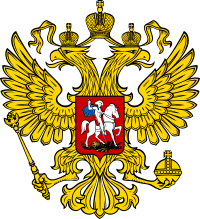 |
Legislative elections will be held in Russia no later than 19 September 2021 to elect the 450 seats the 8th convocation of the State Duma, the lower house of the Federal Assembly. Going into the elections, United Russia is the ruling party after winning the 2016 elections with 54.2% of the vote and 343 seats.
Electoral system
Under current election laws, the State Duma is elected for a term of five years, with parallel voting. Half of the seats (225) are elected by party-list proportional representation with a 5% electoral threshold, with the other half elected in 225 single-member constituencies by first-past-the-post voting.[1]
In the proportional part, candidates can be nominated only by political parties. The lists of parties must include at least 200 and no more than 400 candidates. The list may also include candidates who are not members of the party, but their number should not exceed 50% of the number of candidates on the list. The party list of candidates should be divided into federal and regional parts. The regional part includes regional groups of candidates corresponding to the group of bordering federal subjects. The number of regional groups must be at least 35. No more than ten candidates may be included in the federal part of the list of candidates. The regional parts of the party list should cover the entire territory of Russia.[2]
In the majoritarian part, candidates can be nominated both by political parties and in the order of self-nomination. The political party must provide a list of candidates to the Central Election Commission, and the list must contain the name and number of the constituencies in which each candidate will run. Documents of candidates-self-nominees, unlike candidates from political parties, have to submit applications to District Election Commissions.[3] For registration, the self-nominated candidate must collect at least 3% of the signatures of voters residing in the constituency (or at least 3,000 signatures if the constituency has less than 100,000 voters).[4]
One and the same candidate can be nominated both in the party list and in the single-member constituency, however, in the case of its passage to the State Duma and the party list and in the single-member constituency, he will need to give up one of the places (usually refuse the seat received on the party list, as in this case the party does not lose this seat and simply will give another candidate).
Participating parties
As of 15 June 2018, 63 political parties can participate in the elections.[5] At the same time, parties represented in the State Duma, parties that received more than 3% of the vote in the previous elections or are represented at least in one of the regional parliaments are allowed to contest in the elections without collecting signatures. Other parties need to collect signatures to participate in the elections. The official list of parties entitled to participate in the elections without collection of signatures will be announced before the election, but at the moment, there are only 14 such parties.[6][7]
Parties represented in the State Duma
| Party | Party leader | Leader since | Leader's seat | Ideology | 2016 election | Current seats | ||
|---|---|---|---|---|---|---|---|---|
| United Russia | Dmitry Medvedev | 26 May 2012 | None [a 1] | National conservatism / Statism / Russian nationalism | 54.2% | 343 / 450 |
340 / 450 | |
| Communist Party of the Russian Federation | Gennady Zyuganov | 14 February 1993 | No. 1 in Federal List | Communism / Marxism–Leninism | 13.4% | 42 / 450 |
43 / 450 | |
| Liberal Democratic Party of Russia | Vladimir Zhirinovsky | 12 April 1991 | No. 1 in Federal List | Russian nationalism / Pan-Slavism | 13.2% | 39 / 450 |
39 / 450 | |
| A Just Russia | Sergey Mironov | 27 October 2013 | No. 1 in Federal List | Social democracy / Democratic socialism | 6.2% | 23 / 450 |
23 / 450 | |
| Rodina | Aleksey Zhuravlyov | 29 September 2012 | Anna | Russian nationalism / National conservatism | 1.51% | 1 / 450 |
1 / 450 | |
| Civic Platform | Rifat Shaykhutdinov | 17 April 2015 | Neftekamsk | Economic liberalism / Liberal conservatism | 0.2% | 1 / 450 |
1 / 450 | |
Parties represented in the Regional Parliaments
Parties represented in regional parliaments, which can also participate in legislative elections without collecting signatures (the list does not include parties already represented in the State Duma).
| Party | Party leader | Leader since | Ideology | 2016 election | |
|---|---|---|---|---|---|
| Communists of Russia | Maxim Suraykin | 22 April 2012 | Communism / Marxism–Leninism | 2.3% | |
| Yabloko | Emilia Slabunova | 20 December 2015 | Social liberalism / Pro-Europeanism / Social democracy | 2.0% | |
| Russian Party of Pensioners for Social Justice | Vladimir Burakov | 29 July 2016 | Social conservatism | 1.8% | |
| Party of Growth | Boris Titov | 4 July 2016 | Liberal conservatism | 1.3% | |
| Russian Ecological Party "The Greens" | Anatoly Panfilov | 6 July 2016 | Environmentalism / Centrism / Green politics | 0.8% | |
| People's Freedom Party | Mikhail Kasyanov | 2 July 2016 | Conservative liberalism / Liberal democracy / Pro-Europeanism | 0.7% | |
| Patriots of Russia | Gennady Semigin | 20 April 2005 | Social democracy / Democratic socialism / Left-wing nationalism | 0.6% | |
| Civilian Power | Kirill Bykanin | 8 July 2016 | Liberalism | 0.1% | |
Public expression of interest
- 2018 presidential candidate Ksenia Sobchak has stated that her party will run for State Duma in 2021.[8] On 15 March 2018, Ksenia Sobchak and Dmitry Gudkov announced the creation of the Party of Changes on the basis of the party Civic Initiative.[9]
- Businessman Sergei Polonsky, in January 2018, announced his intention to create a political party "For All", with which he intends to participate in the 2021 election.[10]
Opinion polls
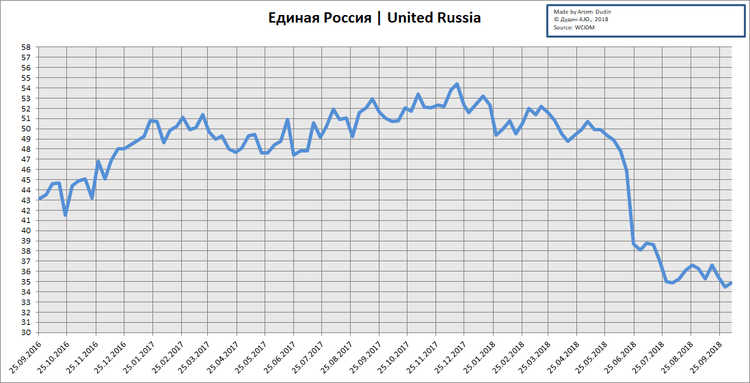
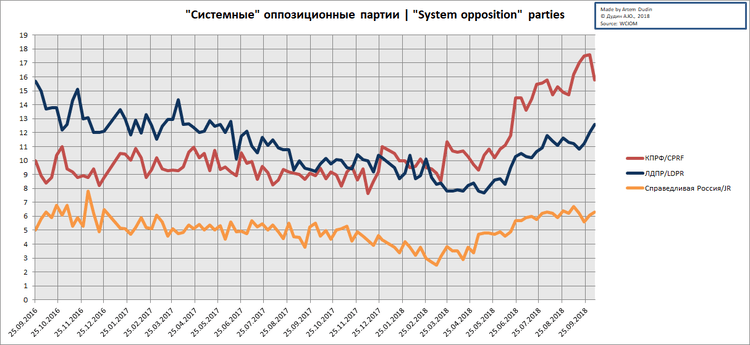
Footnotes
- 1 2 Dmitry Medvedev sits as Prime Minister
References
- ↑ Федеральный закон "О выборах депутатов Государственной Думы Федерального Собрания Российской Федерации" от 22.02.2014 N 20-ФЗ (последняя редакция)
- ↑ Статья 39. Выдвижение федерального списка кандидатов
- ↑ Статья 40. Выдвижение политической партией кандидатов по одномандатным избирательным округам
- ↑ Статья 45. Сбор подписей избирателей
- ↑ СПИСОК ПОЛИТИЧЕСКИХ ПАРТИЙ, ИМЕЮЩИХ ПРАВО В СООТВЕТСТВИИ С ФЕДЕРАЛЬНЫМ ЗАКОНОМ ОТ 11.07.2001 № 95-ФЗ «О ПОЛИТИЧЕСКИХ ПАРТИЯХ» ПРИНИМАТЬ УЧАСТИЕ В ВЫБОРАХ
- ↑ Федеральный закон от 22.02.2014 N 20-ФЗ (ред. от 28.12.2016, с изм. от 13.04.2017) "О выборах депутатов Государственной Думы Федерального Собрания Российской Федерации" Статья 44. Поддержка выдвижения федеральных списков кандидатов, кандидатов
- ↑ Сведения о политических партиях, выдвижение которыми кандидатов, списков кандидатов не требует сбора подписей избирателей
- ↑ Ведомости (2018-01-18). "Собчак собралась участвовать в выборах в Госдуму в 2021 году". Retrieved 2018-02-08.
- ↑ Дмитрий Гудков и Ксения Собчак создадут "Партию перемен"
- ↑ Полонский намерен победить в президентской гонке в 2024 году

.jpg)
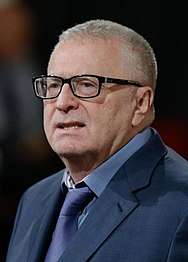
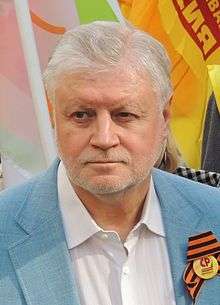
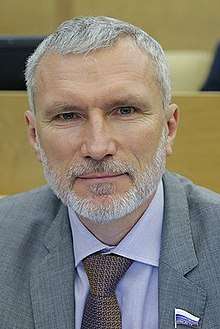
.jpg)